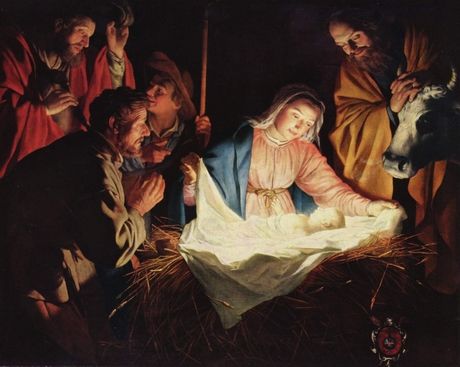On August 20, we celebrated the feast of of Saint Bernard of Clairvaux (1090-1153), Mellifluous (“honey-tongued”) Doctor of the Church, Marian devotee, and Last Father of the Church. Saint Bernard has been referred to as the “man of the twelfth century,” responsible for healing the Church schism of that time, preaching the Second Crusade, writing prayers, poems, and hymns, and “re-founding” the Cistercian Order. His writings have laid a foundation of our faith, which still inspires today. Particularly devoted to Our Blessed Mother, the following excerpted sermon calls us to Meditate on the Mysteries of Christ, as experienced by Mary.
The child to be born of you will be called holy, the Son of God, the fountain of wisdom, the Word of the Father on high. Through you, blessed Virgin, this Word will become flesh, so that even though, as he says: I am in the Father and the Father is in me, it is still true for him to say: “I came forth from God and am here”.
In the beginning was the Word. The spring was gushing forth, yet still within himself. Indeed, the Word was with God, truly dwelling in inaccessible light. And the Lord said from the beginning: I think thoughts of peace and not of affliction. Yet your thought was locked within you, and whatever you thought, we did not know; for who knew the mind of the Lord, or who was his counsellor?
And so the idea of peace came down to do the work of peace: The Word was made flesh and even now dwells among us. It is by faith that he dwells in our hearts, in our memory, our intellect and penetrates even into our imagination. What concept could man have of God if he did not first fashion an image of him in his heart? By nature incomprehensible and inaccessible, he was invisible and unthinkable, but now he wished to be understood, to be seen and thought of.
But how, you ask, was this done? He lay in a manger and rested on a virgin’s breast, preached on a mountain, and spent the night in prayer. He hung on a cross, grew pale in death, and roamed free among the dead and ruled over those in hell. He rose again on the third day, and showed the apostles the wounds of the nails, the signs of victory; and finally in their presence he ascended to the sanctuary of heaven.
How can we not contemplate this story in truth, piety and holiness? Whatever of all this I consider, it is God I am considering; in all this he is my God. I have said it is wise to meditate on these truths, and I have thought it right to recall the abundant sweetness, given by the fruits of this priestly root; and Mary, drawing abundantly from heaven, has caused this sweetness to overflow for us.










0 comments:
Post a Comment
Thanks for leaving a comment. If you wish to submit a prayer request, however, please do so above, using the "Contact" tab.